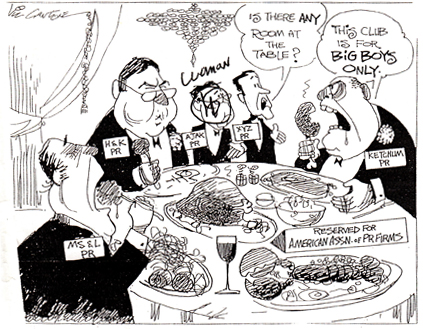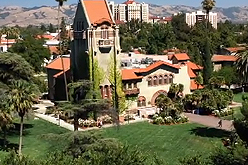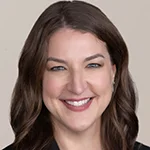The Council of PR Firms, which is celebrating its 15th anniversary, needs a new name to reflect changing conditions.
A name that was used initially was "American Association of PR Firms," no doubt modeled after the American Assn. of Advertising Agencies. However, this was dropped in favor of CPRF. We think the ad conglomerates, the major funders of CPRF and which have extensive holdings worldwide, played a role in that decision. But "PR," meaning relations with the public, is a uniquely American invention.
However, this was dropped in favor of CPRF. We think the ad conglomerates, the major funders of CPRF and which have extensive holdings worldwide, played a role in that decision. But "PR," meaning relations with the public, is a uniquely American invention.
We urge Council leaders to put "America" back in the title. America stands for democracy, justice, fairness, and equality for all.
The established, legally-recognized professional associations, American Bar Assn., American Medical Assn., and American Institute of CPAs, all start out with the word American. They know what they are doing.
The above three are recognized by government agencies and have formal methods for dealing with transgressors.
The communications counseling business should align itself as much as possible with those three.
Possible new names are American Communications Counselors, Strategic Counselors of America and Assn. of American Communications Firms.
Members Want the Change
Where did we get this idea from? The members themselves at their anniversary dinner Oct. 23 in the Park Lane, New York.
We talked to many of the 100+ members present during the cocktail hour who said they had talked to numerous members themselves.
"There's no question that a majority of the people in this room want a new name," said several members. "PR does not reflect what we do any more," said one.
The term is too identified with media relations when a great deal of today's work involves dealing directly with consumers, said the source. Counseling on broad client issues is a main occupation. Some firms are taking on the role of management consultants.
CPRF chair Dave Senay told the dinner that use of the term "PR" by members is declining. He said a survey of members in 2010 found that 69% refer to themselves as "PR firms" and 31% said they don't.
A 2013 survey found 46% refer to themselves as PR firms, 38% said yes, but not exclusively, and 16% said "no."
It's worse than that. Only 13 of the current 110 members use "PR" in the title of the firm, down from 18 in 2003 when there were 99 members.
Two of Top 50 Firms Use PR
Only two of the firms in the "top 50" of the O'Dwyer ranking use PR—Coyne and 5W.
Sixteen of the firms in the O'Dwyer top 25 are members of CPRF.
That means nine major firms have decided not to join—Ruder Finn, ICR, DKC, Qorvis, Allison + Partners, Regan, Zeno, Atomic, Hunter and 5W.
Some of the non-joiners said they are not going to pay fees of up to $40,000 yearly (.65% of U.S. net fees) for the privilege of being in CPRF.
Besides the expanded duties of Council members, there is an image problem with the term "PR" itself. A $150K study of believable sources of information, published in 1999 by PR Society of America after five years of research that involved interviews with 2,500 members of the public, found "PR specialist" to rank 43 on a list of 45 sources, even worse than "political party leader" (no. 42).
At least nine books about PR have the word "spin" in the title.
The antics of the PR Society including blocking all press from the Assembly three years in a row and O'Dwyer reporters from all sessions and the exhibit hall for three years, are not doing the term "PR" any good.
Conglomerates Dominate CPRF
The bulk of the $1,368,872 in Council revenues in 2012 (EIN: 13-4011840) came from the conglomerates—Omnicom, WPP, Interpublic, Publicis and Havas.
An initial goal of CPRF in 1998 was taking control of the ranking of PR firms that was being done by the O'Dwyer Co., PR Week/U.S. (which began publishing in 1998) and The Holmes Report.
Jack Bergen, CPRF president, claiming 125 PR firm members including all those owned by the conglomerates (they had purchased 19 of the top 25 firms in the O'Dwyer ranking), said members were fed up dealing with three different rankings and that henceforth members should only submit financials to the CPRF itself.
The Council used a 5,000 mailing list supplied by PRW/U.S. to gather information from firms. PRW's initial circulation in the U.S. was the PR Society membership list. The Society urged members to support PRW/U.S. with ads and subscriptions, drawing a complaint from 2000 chair Steve Pisinski who said the Society had no business interfering in the private marketplace.
 Cartoon from 1998 O'Dwyer's magazine. |
We called CPRF "a rogue organization" because it was trying to perform an editorial function.
Whereas the O'Dwyer rankings required top pages of income tax returns, W-3s and other documents and kept non-PR income to a minimum, CPRF required no such documents and allowed up to 49% of income to include commissions on corporate and issue ads, profits from graphics, printing and video production, and research in support of PR.
This was a prescription for astronomical revenue figures.
The conglomerate-owned firms refused to provide any fee income figures for the O'Dwyer rankings but 48 members did so as well as 82 other independent PR firms.
CPRF's move to take over the rankings failed. It gave up completely in 2002 when Sarbanes-Oxley promised heavy penalties for any public company that provided misleading or false financials.
The Council still shows too much influence by the conglomerates. Taking a new name that includes "America" or "American" would show that its conglomerate-dominated days are over.
History of CPRF Needed
 San Jose State Univ. |
The Council is an important addition to industry organizations and does lots of good work including its current series of "Take Flight to PR" career forums at colleges including the one at Boston University Oct. 3 and one tomorrow at San Jose State University that will feature James Weiss of W2O Group; Annemiek Hamelinck, Waggener Edstrom; Jason Mandell, LaunchSquad; Lou Hoffman, Hoffman Agency; Bill Orr, Burson-Marsteller and Tracy Parry, Airfoil. All the firms except B-M take part in the O'Dwyer rankings.
SJSU, with 31,000 students, is the founding school of the 23-campus California State University. Many of its students take jobs at Silicon Valley companies.
Wikipedia has a superficial 2,000-word essay on the PR Society but nothing at all on CPRF.
Professors Duck O'Dwyer Table
Having just attended the national conference of the Society, where 250 PR professors were among those present and 48 of them spoke at the training sessions, we can't help wondering why the professors or at least their graduate students are not working on histories of the Society, CPRF, Arthur W. Page Society, PR Seminar and Institute for PR.
Although this reporter had a work station set up in the middle of the Marriott lobby, wearing a name badge and displaying a copy of the O'Dwyer magazine on the table, none of the professors ever approached us or even said hello.
We have been unable to interest any of the 13 board members of the Society's Educators Academy in visiting the new O'Dwyer's PR Library that has 700 volumes plus much other material.
Where is the scholarship that professors are supposed to produce?
Professors at the conference who spoke and who are Ph.Ds were Alexa Agugliaro, Penn State; Ann Christiano, Univ. of Fla.; Shannon Bowen, Univ. of S.C.; Linnie Carter, Harrisburg Community College; Jeanette Drake, Univ. of Findlay; Kathie Fleck, Ohio Northern; Sandra Duhe, Southern Methodist Univ.; Dean Kruckeberg, Univ. of N.C.; Rochelle Ford, Howard Univ.; Cheryl Ann Lambert, Boston Univ.; Regina Luttrell, Eastern Mich,; Marcus Messner, Va. Commonwealth; Vivian Medina-Messner, Va. Commonwealth; Jay Rayburn, Fla. State; Hillary Sisco, Quinnipiac; Bey-Ling Sha, San Diego State; Don Stacks, Univ. of Miami; Candace White, Univ. Tenn.; Donald Wright, Boston Univ.; John Wirtz, Univ. Ill.; Katerina Tsetsura, Univ. Okla.
Profs Blocked at-large Student Memberships
PR professors were vocal opponents of moves dating from 2001 to allow students from any college to join the Society's Student Society. Only students in the 300 PR Society Student chapters are allowed to join. This blocks such memberships by students in 3,700 other colleges.
The Western District of the Society proposed at-large student memberships in 2008 but ran into fierce opposition from PR professors whose students were already facing competition for jobs from non-PR majors. A study found that only 10-15% of hires for PR jobs are PR or communications majors.
The professors blocked the proposal from getting to the floor of the 2008 Assembly. Joe Trahan, chair of the Educators Academy, and Casey DeLorme of the Western district, stood before the Assembly and said the district and Academy would work on a compromise that would be presented to the Assembly. It never was.
The politics the professors played with the at-large student proposal was a lesson for students in the rough-and-tumble real world of business, academia and trade associations. Professors are the controlling membership bloc in the Society that has kept national offices in the hands of APRs (18% of the members) since the 1970s.


 AB InBev has hired Donna Lorenson as chief communications officer and elevated the PR function to the senior leadership structure in the aftermath of the Bud Light marketing disaster.
AB InBev has hired Donna Lorenson as chief communications officer and elevated the PR function to the senior leadership structure in the aftermath of the Bud Light marketing disaster. Tunheim handled the Minnesota USA World Expo bid committee, which on June 21 congratulated Serbia for landing the 2027 event.
Tunheim handled the Minnesota USA World Expo bid committee, which on June 21 congratulated Serbia for landing the 2027 event. United Minds, management consultancy, has launched Myriant, a business resiliency offering to help clients deal with the challenges during this era of misinformation, polarization and geopolitical upheaval.
United Minds, management consultancy, has launched Myriant, a business resiliency offering to help clients deal with the challenges during this era of misinformation, polarization and geopolitical upheaval.  ImageShield, which guards against online image abuse, is looking for a communications pro to handle its PR and marketing campaigns.
ImageShield, which guards against online image abuse, is looking for a communications pro to handle its PR and marketing campaigns. Who knew that there is a real paper company, Pennsylvania Paper & Supply, inside the iconic building seen at the opening of every episode of “The Office?”
Who knew that there is a real paper company, Pennsylvania Paper & Supply, inside the iconic building seen at the opening of every episode of “The Office?” 


 Have a comment? Send it to
Have a comment? Send it to 
No comments have been submitted for this story yet.